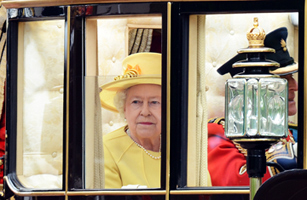
Technically, it was an act of treason. Britain’s Treason Felony Act of 1848
forbids subjects of the queen from calling for the abolition of the
monarchy. The law is no longer enforced, which is good news for the several
dozen Brits in central London on Friday who placed a Queen Elizabeth II impersonator in the gallows with a sign on her head saying “Best Before:
Circa 1700.”
The mock imprisonment was part of the “Not the Royal Wedding Street Party”
hosted by Republic, a campaign group that wishes to replace the monarchy
with an elected head of state. The 14,000-strong group wants to strip the
Queen of her remaining “prerogative powers,” such as the requirement that
parliamentary bills have her formal assent before they become law, and
her ability to disband the British Parliament and the legislatures of
several Commonwealth countries . And it’s seen the wedding of Prince William and Kate
Middleton as an opportunity to push its agenda forward.
Talk of revolution and mock gallows aside, the Republican street party was
hardly a Cromwellian affair. Unlike the army of Oliver Cromwell, which
briefly overthrew the monarchy in the 17th century in two bloody civil wars,
these rebels were a jovial, good-humored bunch. Cucumber sandwiches were
served, a face-painting artist made the rounds, and a band jammed in the
middle of the street.
“Republicanism today is a slow-moving movement,” said Silvia Carter, 65, a stage director in London. “We aren’t radicals. We understand
that the abolition of the monarchy might take 40 or 50 years, but it will
inevitably happen.”
If turn-out is any indication of interest, however, the movement may have
to wait longer than that. Hundreds of thousands of Britons took to the streets
around Buckingham Palace and Westminster Abbey to cheer the royal couple on Friday.
Republic’s rival fete attracted only around a thousand people, according to the group. But far from
sulking like the losing side of a nationwide popularity contest, many at
the party claimed that the massive royal wedding would paradoxically boost
their cause by exposing the absurdity of Britain’s antiquated political
system.
“The more scrutiny we can place on the royal family the better,” said David
James, 27, who pointed to references in the British press of Kate Middleton
as a “commoner” because she does not come from a royal lineage. “The whole
idea of noble blood — of a class of people intrinsically superior to the
rest — is antithetical to a democracy, and this wedding will help expose
that.”
Republic was not the only outfit enjoying some irreverent anti-monarchy
protesting on the royal family’s big day. The liberal British newspaper The
Guardian allowed digital readers to join the rebel cause by signing up to
send the couple one of three gifts: a home-assembly guillotine kit, keys to
an exile’s apartment in Elba and a biography of Charles I .
And the sentiment stretches beyond Britain. Republic was joined at its street party on Friday by representatives of anti-monarchy
movements in Spain, the Netherlands, Belgium, Denmark, Norway and Sweden.
On
Saturday, this Alliance of European Republican Movements — as the group calls
itself — will hold a conference on how to mobilize European populations
against the vestiges of absolute rule in what is now the world’s
most democratic continent. “We had a similar situation in Sweden when our royal married a
non-blue-blood,” says David Hesslefors of the Swedish Republican
Association, referring to the marriage last year of Princess Victoria of
Sweden to her personal trainer. “But such distinctions can only help expose
the absurdity of a situation of having a hereditary head of state.”
Hesslefors says William and Kate’s large following among Brits will draw attention to the monarchy, which he believes cannot survive under continued scrutiny. “British Republicans are lucky that William and Kate are so popular,” he
adds, before pausing. “Or at least that’s the theory.”
Royal Faux Pas: What Not to Wear to the Royal Wedding
Kate Middleton’s Fashion Evolution